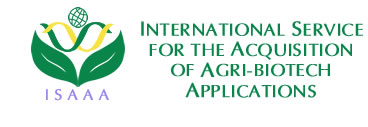ISAAA Statement on Crop Biotechnology
4-17 December 2016: 8th meeting of the Conference of the Parties serving as the meeting of the Parties to the Cartagena Protocol on Biosafety (COP-MOP 8), Cancun, Mexico.
Thank you Madam Chair.
I speak on behalf of the International Service for the Acquisition of Agribiotech Applications (ISAAA).
ISAAA facilitates knowledge sharing on all aspects of crop biotechnology including Biosafety, especially in developing countries. This helps small farmers to make informed choices on this beneficial technology. In the light of climate change and the need for sustainable development and the growing global population, this is crucial.
Madam Chair, ISAAA is in support of responsible use of technology where risks and benefits are weighed scientifically and factually, thus we support the initiatives of Cartagena Protocol on Biosafety and the Convention on Biological Diversity.
Both Article 16 and 19 of the Convention explicitly mention biotechnology and acknowledge its benefits and the need for Parties to provide for the effective participation in biotechnological research activities by those Contracting Parties, especially developing countries.
It has been two decades since we started cultivating biotech crops and consuming GM foods and to date not a single health or environmental hazard or negative impact on biodiversity has been reported and verified. In fact, these crops have brought tremendous benefits to the environment in reducing the use of pesticides and release of greenhouse gasses. Therefore, it is time to rethink our regulation framework and make it more practical for these crops to reach the farmers. More than 2000 studies and at least 250 scientific organisations around the world have endorsed the safety of GM foods that are in the market today. Furthermore, more than 120 Nobel laureates called upon the environmental groups to accept the safety and stop demonising biotechnology.
Unfortunately, in spite of the two decades of success, we are still embroiled in debates that results in extremely difficult regulations and sometimes unscientific decisions.
ISAAA feels the review of the Protocol should also focus on the impact of the regulations and farmers' choice on agriculture practices, conservation and sustainable use of biodiversity.
Thank you Madam Chair.


